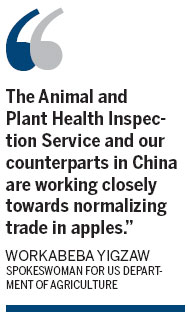

|
A worker harvests apples on a farm in the United States. Chinese agricultural officials are close to allowing Washington state's Red and Golden Delicious apples back into China next month after a two-year ban. Provided to China Daily |
Chinese agricultural officials are close to allowing Washington state's Red and Golden Delicious apples back into China next month after a two-year ban. It is unclear whether that will also open up the US import of apples from China, which produces half the world's apples.
"The Animal and Plant Health Inspection Service and our counterparts in China are working closely toward normalizing trade in apples," Workabeba Yigzaw, a spokeswoman for the US Department of Agriculture, said in a statement.
"We look forward to enhancing our bilateral trade relationship and continuing our work toward this mutually beneficial goal with China," she said .
The ban was imposed on Washington, which supplies 80 percent of America's apples, after a shipment to China in early 2012 was declared to be carrying "post-harvest diseases."
The two varieties were the only US apples allowed in China. They began being imported in 1993, with about 500,000 boxes shipped annually.
US agricultural officials challenged the ban last year, claiming that any diseases in the 2012 shipment only affected crabapples for pollination.

According to the Northwest Horticultural Council, agricultural representatives from both countries met in Xiamen, China, in November, and agreed to new inspections by Chinese officials of Golden Delicious and Red Delicious apples in Washington.
The USDA's Animal and Plant Health Inspection Service also drew up a pest list for Chinese imports, which signals that the US government is moving toward opening up the market for Chinese apples, according to the US Apple Association.
US apple sellers are concerned about what that might mean for their fruit, noting that the import of apple juice to the US from China begun in the 1990s, and it's contributed to Chinese apple juice brands dominating the US market.
However, China is likely to triple its imports of apples in the next decade, according to Desmond O'Rourke, a Washington State University agriculture economics professor who monitors Asian imports of fruits.
With a surplus forecast of 15 million bushels of apples in Washington over the next few years because of increased planting, Washington growers hope to cash in on the growing Chinese market, even as the potential opening of the US market will possibly have them competing with Chinese brands at home.
 Getting in the mood
Getting in the mood
 Models at Mercedes pavilion at 2013 Auto Guangzhou
Models at Mercedes pavilion at 2013 Auto Guangzhou
 Buick Riviera concept car at 2013 Auto Guangzhou
Buick Riviera concept car at 2013 Auto Guangzhou
 FAW-VW all-new Golf at Guangzhou auto show
FAW-VW all-new Golf at Guangzhou auto show
 VW donates more than 5k child safety seats
VW donates more than 5k child safety seats
 Honda models at 2013 Guangzhou auto show
Honda models at 2013 Guangzhou auto show
 Honda Jade at the 2013 Guangzhou auto show
Honda Jade at the 2013 Guangzhou auto show
 Toyota's new Reiz debuts at 2013 Auto Guangzhou
Toyota's new Reiz debuts at 2013 Auto Guangzhou